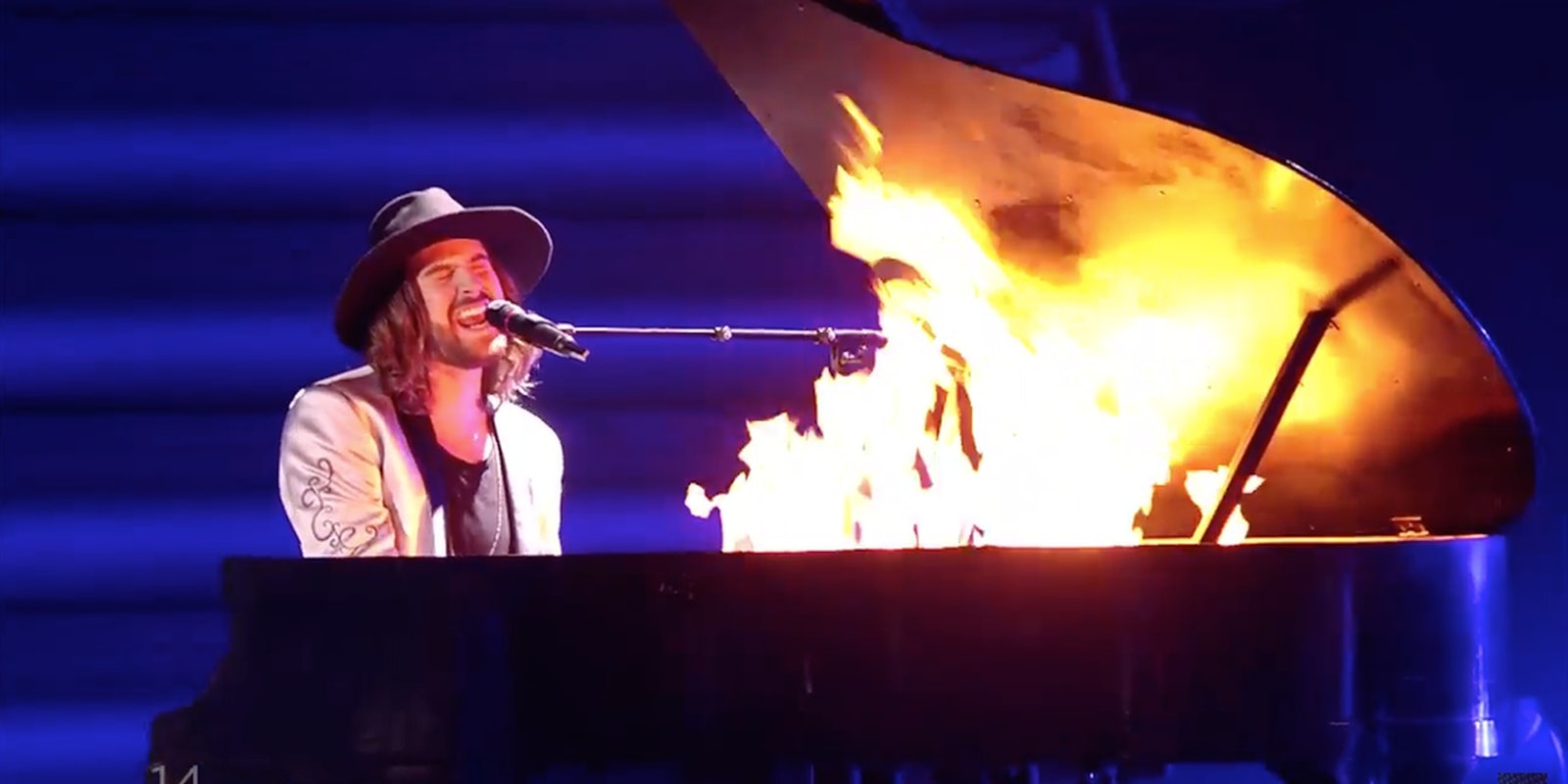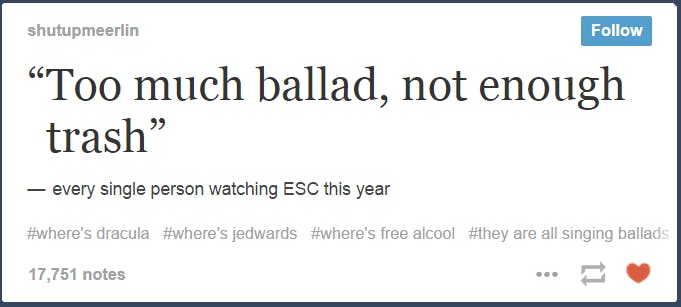On Saturday, Europe got together for its annual celebration of strobe lights, drunk TV presenters, C-list techno acts, and international disunity. It was Eurovision weekend, and this year’s contest was… OK, I guess? Basically, this:
The 2014 winner, bearded drag queen Conchita Wurst, had made the most of her yearlong reign and become something of an international celebrity. Her successor, Sweden’s Måns Zelmerlöw, is less likely to achieve this level of popularity. He was an uncontroversial choice, a likable pop act with absolutely no distinguishing features whatsoever.
Conchita hands over the Eurovision trophy to some bro who looks like Literally Any Man.
— Gavia Baker-Whitelaw (@Hello_Tailor) May 23, 2015
But people cheered him anyway, mostly because he wasn’t from Russia. Last year’s Russian entrant inspired so much audience backlash (for political reasons rather than the quality of their performance) that Russian TV introduced “anti-booing technology” for this year’s broadcast—although in the end they didn’t need it. Polina Gagarina’s song was shockingly successful, creating a tense 20 minutes where it seemed likely she might win.
So much for other European countries being biased against Russia’s homophobic reputation and recent military activities. (Ukraine, by the way, could not afford to submit a Eurovision entry this year.)
I will always fantasize about Russia forced to host a Eurovision where every single nation of the EU unites to send girls kissing
— 🌏🔎Leigh Alexander 🐬💿✨ (@leighalexander) May 23, 2015
Eurovision’s voting system involves every one of the 40 countries giving points to their favorite acts onscreen, a laborious process designed to ramp up the tension—and highlight the blatant favoritism displayed by countries who just vote for their neighbors and political allies. Things were unusually dramatic this year, as Russia remained at the top of the leaderboard for a long time.
someone has added #Eurovision2015 under “List of wars between Russia and Sweden” on Wikipedia. pic.twitter.com/8sO2a0tDQZ
— Roz Warren (@RossalynWarren) May 23, 2015
People began to wonder what would happen if Russia won and had to host the contest next year, since Eurovision is famously LGBT-friendly. Could Eurovision even take place in a country with such a poor LGBT rights record, after Russia went as far as to relaunch an old Soviet song contest to avoid acts like Conchita Wurst?
While political messages are discouraged on the Eurovision stage, the contest is often used to convey subtle statements to the rest of Europe. For example, Armenia’s entry is reputedly about Turkey’s refusal to acknowledge the Armenian Genocide, while several other acts included subtextual support for LGBT equality.
https://twitter.com/KloKlo/status/602238195653332994
https://twitter.com/odhreo/status/602234615273803777
Russia even trolled everyone by pretending to award itself full points, a “joke” that fell totally flat.
https://vine.co/v/eqXVU2zwB9O
#Eurovision ‘here’s a funny joke about fixing election results. Hello? Hello? Is this thing on?’ #russia
— Si Spencer (@SiSpencer) May 23, 2015
Fortunately, Sweden won out in the end, although its entry was nowhere near as memorable as some of the runners up.
Eurovision 2015 gave us disappointingly few weird entries, with far too many countries opting for lavishly staged ballads. Australia, which became an honorary European nation for the night, put forward a legitimately fun and non-ridiculous contestant, evidently confusing Eurovision for a genuine contest of quality and skill. You’ll learn, Australia. You’ll learn.
Australia completely devaluing the spirit of #Eurovision by putting in a decent act. Disgraceful. Disqualify them right now.
— The Geek Agenda (@TheGeekAgendaUK) May 23, 2015
https://twitter.com/johannthors/status/602227184082653184
To balance things out, Austria set a grand piano on fire, Israel entered an embarrassing rap boy band, and Azerbaijan offered up some kind of interpretive dance about shirtless yoga werewolves.
Also, Georgia’s contestant looked like a cartoon supervillain, donning black feathered shoulder pads. Comics Twitter immediately began to theorize that several Eurovision acts were actually characters from The Wicked + The Divine, an ongoing comic about godlike pop stars.
https://twitter.com/sadwhitegrrrl/status/602217966227193856
https://twitter.com/McKelvie/status/602239906967060480
How did I not figure out til now that #wicdiv is just Eurovision with deaths?
— Be Amy, Do Crime (@taterpie) May 23, 2015
Comic book references aside, Eurovision was as reliable as ever. We got a few painfully terrible entries, some political statements (Lithuania included same-sex kisses in their act; people cruelly made fun of the Greek financial crisis), and enough bland ballads (a.k.a. drinking breaks) for everyone watching at home to get thoroughly trashed by the end of the night. And no matter who actually won the contest, the true star of the show was clearly Conchita Wurst once again.
Photo via sfslim/Twitter



